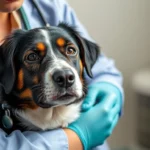
In the hustle and bustle of daily life, it’s not uncommon for our beloved pets to get into things they shouldn’t. One alarming situation that can arise is when a dog ingests human medications, particularly birth control pills. If you’re here because you’re worried about your furry friend after discovering they’ve eaten your birth control, you’re not alone. Understanding the implications of this incident is crucial for your dog’s health and safety.
Understanding Birth Control Medications
Types of Birth Control Pills
Birth control pills are designed to regulate hormonal levels in women and come in various types. The most common categories include:
- Combination Pills: These contain both estrogen and progestin. They work by preventing ovulation and altering the uterine lining.
- Progestin-Only Pills: Also known as the mini-pill, these contain only progestin and are often recommended for women who cannot take estrogen.
The active ingredients in these medications can vary, but common hormones include ethinyl estradiol and levonorgestrel.
Purpose and Function
Birth control pills primarily serve to prevent pregnancy by regulating hormones in the body. They work by:
- Preventing ovulation (the release of an egg from the ovaries)
- Thickening the cervical mucus to obstruct sperm entry
- Altering the uterine lining to make it less suitable for implantation
Understanding how these medications function in humans helps illustrate why they may pose risks when ingested by dogs.
Why Dogs May Ingest Birth Control
Curiosity and Exploration
Dogs are naturally inquisitive creatures. They explore their environment through their noses and mouths, which means household items, including medications, can pique their interest. Birth control pills might have a scent or packaging that attracts them, leading to accidental ingestion.
Potential Health Risks
The ingestion of birth control pills can pose various health risks to dogs. While some medications may not be highly toxic, others can lead to significant health issues. Common symptoms to watch for if a dog ingests medication include:
- Vomiting
- Diarrhea
- Lethargy
- Loss of appetite
- Abdominal pain
The severity of these symptoms can depend on the type and amount of medication ingested.
Immediate Actions to Take
Assessing the Situation
If you suspect your dog has eaten your birth control, the first step is to assess the situation. Consider the following:
- Type of Medication: Identify the specific birth control pill ingested.
- Amount Ingested: Estimate how many pills your dog may have consumed.
- Packaging: Keep the packaging handy to provide details to your veterinarian.
This information is crucial for your vet to determine the appropriate course of action.
Contacting Your Veterinarian
Once you have assessed the situation, it’s time to contact your veterinarian. When calling, be prepared to provide:
- Your dog’s weight, age, and breed
- A description of the medication, including active ingredients
- Any observed symptoms
During the vet consultation, your veterinarian will guide you on the next steps, which may include bringing your dog in for an examination.
Potential Outcomes and Treatments
Possible Reactions in Dogs
The ingestion of birth control pills can lead to various reactions in dogs, including:
- Gastrointestinal Upset: Common symptoms include vomiting and diarrhea.
- Lethargy: Dogs may appear tired or less active than usual.
- Hormonal Imbalances: Depending on the amount ingested, dogs may experience altered hormone levels, which could lead to more severe health issues.
Treatment Options
Treatment for a dog that has ingested birth control pills may include:
- Inducing Vomiting: This is often done within a few hours of ingestion. Your veterinarian may do this in the clinic or instruct you on how to proceed at home if appropriate.
- Activated Charcoal: If your dog has ingested the pills recently, your vet may administer activated charcoal to help absorb the medication and limit its effects.
- Follow-Up Care: After initial treatment, your dog may require monitoring for any delayed reactions or further symptoms.
It’s important to follow your veterinarian’s guidance closely during this process.
Preventing Future Incidents
Safe Medication Storage
To prevent future incidents of medication ingestion, consider the following best practices for storing medications:
- Keep Medications Out of Reach: Store all medications in cabinets or containers that are inaccessible to pets.
- Use Child-Proof Containers: Opt for child-proof caps or containers, which can also deter pets from accessing medications.
Training Your Dog
Training your dog to avoid scavenging can significantly reduce the risk of accidental ingestion. Techniques include:
- Positive Reinforcement: Reward your dog for ignoring items they shouldn’t touch.
- Redirecting Attention: Distract your dog with toys or activities when they show interest in potentially harmful objects.
Consistent training can help ensure your dog learns what is off-limits.
FAQs about Dogs and Medication Ingestion
What should I do if my dog eats any medication?
If your dog ingests any medication, remain calm and contact your veterinarian immediately. Provide details about the medication, including the name, dosage, and any symptoms your dog may be exhibiting. Prompt action can be crucial in preventing serious health issues.
Are all medications harmful to dogs?
Not all medications are harmful to dogs, but many human medications can be toxic. Common medications that are safe for dogs include certain antihistamines and some antibiotics. However, always consult your veterinarian before giving any medication to your pet.
How can I tell if my dog is having a reaction?
Signs of an adverse reaction to medications can include:
- Vomiting
- Diarrhea
- Lethargy
- Changes in behavior or appetite
If you notice any of these symptoms after your dog has ingested medication, contact your veterinarian for guidance.
Conclusion
Accidentally leaving medications within reach of our pets can lead to distressing situations. If your dog has eaten your birth control, understanding the implications and acting swiftly is crucial. We’ve discussed the types of birth control pills, the potential health risks to dogs, what immediate actions to take, and treatment options available. Remember that your veterinarian is your best resource in these situations.
Being proactive about pet safety includes proper medication storage and reinforcing training to prevent future incidents. Your furry friend’s health is a priority, so stay informed and prepared.









